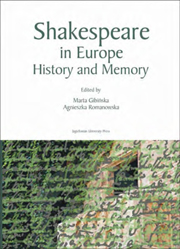Book contents
- Frontmatter
- Contents
- Preface
- Towards a European History of Henry V
- History and Histories
- The Bad Quarto Hamlet and the Polish Connection
- Cross-Histories, Straying Narratives: Anglo-Portuguese Imbrications and Shakespeare's History Plays
- The Art of War in Shakespeare and in European Renaissance Treatises
- The “Histories” of Henry VI
- Shakespeare's Imperfect Memory of History
- “Retail'd to All Posterity:” The Case of Richard III
- Halting Modernity: Richard III's Preposterous Body and History
- History and Memory: Criticism and Reception
- History, Memory, and Ideological Appropriation
- Theatre: The Act of Memory and History in the Making
- Index of Authors
“Retail'd to All Posterity:” The Case of Richard III
from History and Histories
Published online by Cambridge University Press: 05 September 2014
- Frontmatter
- Contents
- Preface
- Towards a European History of Henry V
- History and Histories
- The Bad Quarto Hamlet and the Polish Connection
- Cross-Histories, Straying Narratives: Anglo-Portuguese Imbrications and Shakespeare's History Plays
- The Art of War in Shakespeare and in European Renaissance Treatises
- The “Histories” of Henry VI
- Shakespeare's Imperfect Memory of History
- “Retail'd to All Posterity:” The Case of Richard III
- Halting Modernity: Richard III's Preposterous Body and History
- History and Memory: Criticism and Reception
- History, Memory, and Ideological Appropriation
- Theatre: The Act of Memory and History in the Making
- Index of Authors
Summary
I
What is history? An obvious answer is: History is a body of knowledge about the past. This knowledge is neither stable nor evenly distributed among the members of a given community at a given time. What historians know differs in quantity but also in kind from what the so-called “general public” knows. One could illustrate this with a diagram of widening concentric circles. For the experts in the inner circle one might choose, say, a deep blue to indicate the wealth of information at their disposal and the intensity of their engagement in a discourse about that information. As we move outward from the centre, gradually paler shades of blue eventually fading into white would indicate the dilution of expert knowledge. A highly simplistic model, no doubt, but is it completely off the mark? In the case of Richard III it would seem so. As we move not from the inner to the outer circle, but from the periphery to the centre of our model, what we arrive at is much less distinct, less clear and less solid, much more diffuse, more vague and more contradictory than the well-defined figure of the crookbacked villain whom just about “everyone” knows.
We have become accustomed to treating memory and history as almost the same thing. But it is worth remembering that when Maurice Halbwachs first introduced the term memory into the critical debate, he actually intended it as a counter-concept to history. In the case of Richard III we are well advised to observe the distinction – not in order to construe two neatly separable domains but as a means of addressing the force-fields and tensions created by their interaction.
- Type
- Chapter
- Information
- Shakespeare in EuropeHistory and Memory, pp. 99 - 112Publisher: Jagiellonian University PressPrint publication year: 2008



